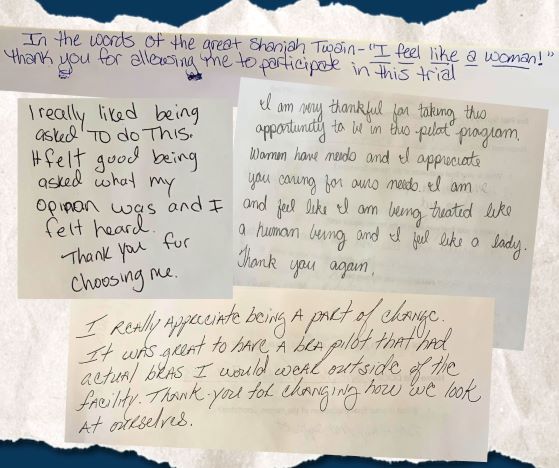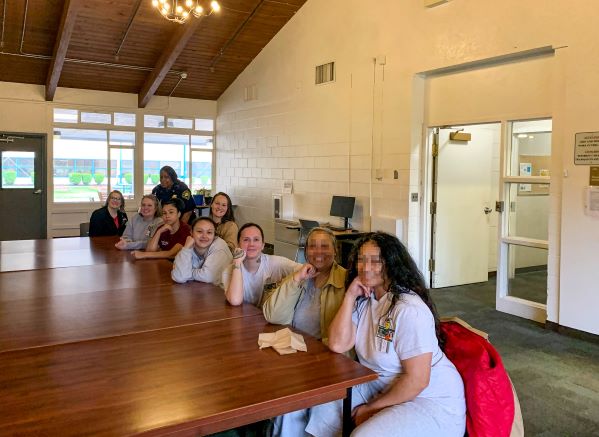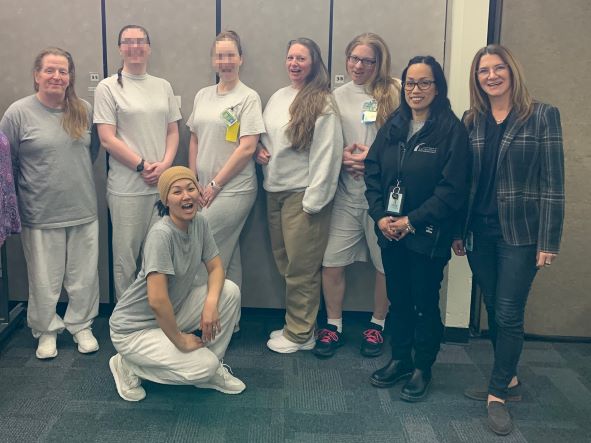Giving Incarcerated Women a Voice and a Choice
March 27, 2024
By Emily Boone (email) Communications Office
Quotes: Handwritten statements from participants of the bra pilot program. (Photo courtesy of Emily Boone, Communications Office)
March is Women’s History Month – a time to celebrate the contributions women have made to the world. This year, we are excited to share the story of contributions made by incarcerated individuals at Mission Creek Corrections Center for Women (MCCCW) and Washington Corrections Center for Women (WCCW).
Groups made up of incarcerated women, transgender and non-binary individuals at both women’s facilities were brought to the table to help inform decisions being made that directly impact them. Through the “Bra Pilot” program, seven individuals from MCCCW and eight from WCCW participated in a month-long trial to help choose new options for state-issued bras.
The thought behind the pilot project is when making changes that directly impact our incarcerated population, their voices should be at the table. This allows us to be gender-responsive, trauma-informed, innovative and inclusive, and gives participants the opportunity to help inform policy development. By adopting this approach, we aim to create an environment that fosters rehabilitation, empowerment and successful reintegration into society.
“I really liked being asked to do this. It felt good being asked what my opinion was – and I felt heard,” said Melissa, a participant from MCCCW. “Thank you for choosing me.”
Recognizing the diversity in body types, Correctional Industries procured six bra options for the pilot, conducting research to determine what would meet our expectations and the needs of the incarcerated. The participants each received several of the options to test for the month-long pilot. What we heard back confirmed the need for a new state-issued bra. The current state-issued bras are revealing, lack support and coverage, and often leave the wearers feeling shame and embarrassment. The bras being tested offered more support, coverage, shape and comfort, both physically and emotionally.
“In the word of the great Shania Twain, I feel like a woman!” said pilot participant Meagan. “Thank you for allowing me to participate in this trial.” She expressed how much better she felt wearing the pilot bra options.
What may seem small to some, is important to so many incarcerated individuals. The new bra options left participants feeling “normal” and having the choice of something so personal is empowering. By taking a gender-responsive approach, we’re recognizing and accounting for the important needs women have during incarceration.
“I am very thankful for this opportunity to be in this pilot program. Women have needs and I appreciate you caring for our needs,” said Theresa, a bra pilot participant. “I am and feel like I am being treated like a human being, and I feel like a lady.”
We’re dedicated to the well-being of incarcerated individuals and committed to creating a positive and supportive environment. We plan to continue our work in including voices of those impacted at the table. The pilot program will launch soon at Airway Heights Corrections Center and Monroe Corrections Center. Ultimately, the results from each facility will be taken back to the incarcerated individual advisory committee with the goal of adding a new bra option to DOC’s state-issued clothing.


